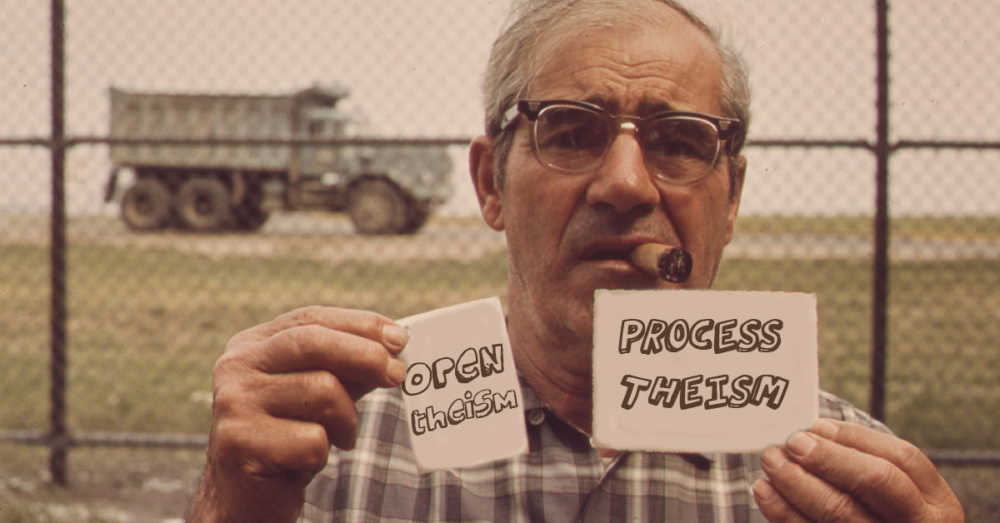We run our website the way we wished the whole internet worked: we provide high quality original content with no ads. We are funded solely by your direct support. Please consider supporting this project.

Process Theology & Open Theism: What’s the Difference?
Question: When ReKnew talks about Open Theism is it a mistake for people to equate it with Process theology, and if so what are the defining differences?
I guess I am starting to lean toward Dr. Boyd’s thoughts for all things theologically egg-heady, so I thought I would ask the question. Your ministry has been freeing for me, and has helped to save my faith after my son had cancer. I only joke because I feel very close to you guys even though we have only met in passing in a very crowded coffee shop and after a couple of sermons that hit me so hard I was at a loss for words.
Answer: Thanks for the kind words of affirmation. I wrote my doctoral dissertation on Process thought (Trinity and Process) where I critiqued the metaphysics of Charles Hartshorne and tried to demonstrate that one can adopt a system that has all the explanatory power of Process Thought (PT) without its unorthodox implications. The unorthodox implications are these.
- In PT, God exists eternally in relation to a non-divine world. So PT denies “creation ex nihilo”
- In PT, God is bound to metaphysical principles that govern both God and the world. So God isn’t able to really interact with the world as a personal being. God must always, of necessity, respond in ways that the metaphysics of the system stipulate. This means…
- In PT God can’t intervene in unique ways, like personally answering prayer
- In PT God can’t intervene and perform miracles
- In PT God can’t become uniquely embodied, as he is in Christ.
These are pretty serious shortcomings. I hope it’s clear that PT has got little in common with Open Theism other than that we both believe the future is partly comprised of possibilities. But even here there is a major difference. In Open Theism, God chooses to create a world with an open future, while in PT God has created of necessity.
I am very concerned that so many progressive thinking evangelicals are flirting with Process Thought. It’s really not a friendly home for anything like orthodox Christianity. While many find the dynamic and relational ontology of process thought, compelling—I can see how this is attractive— the intrinsic nature of the system is hostile to the Christian faith.
If you want to go deeper on this topic, my book Trinity and Process seeks to clarify all that’s positive with PT while avoiding all that’s negative. For a succinct summary of some of the shortcomings of PT, see chapter 9 in my book Satan and the Problem of Evil.
Category: Q&A
Tags: Open Theism, Process Theology, Q&A
Topics: Open Theism What it is and is not
Related Reading

Open Theism Timeline
Open Theism Timeline by Tom Lukashow An argument that is frequently raised against the open view is that it is a recent innovation. Paul Eddy had discovered Calcidius, a fifth century advocate, and I and others knew of L.D. McCabe and Billy Hibbard, two 19th century advocates. But that was about it – until I…

How do you respond to Isaiah 53:9?
Speaking of the suffering servant Isaiah says, “[T]hey made his grave with the wicked and his tomb with the rich…” As with most evangelical exegetes, I believe that Isaiah 53 constitutes a beautiful and stunning prophetic look at the person of Jesus Christ. The most impressive feature of this prophecy is that the suffering servant…

What is the significance of 2 Chronicles 7:12–14?
The Lord says to Solomon, “When I shut up the heavens so that there is no rain, or command the locust to devour the land, or send pestilence among my people, if my people who are called by my name humble themselves, pray, seek my face, and turn from their wicked ways, then I will…

How do you respond to Ephesians 1:11?
“In Christ we have obtained an inheritance, having…been destined according to the purpose of him who accomplishes all things according to his counsel and will.” This text has frequently been used to support the view that all things happen in accordance with God’s counsel and will. But this reads too much into the text. This…

Is There Room for Doubt in Faith?
Many Christians today assume that faith is the antithesis of doubt. In this view, a person’s faith is thought to be strong to the extent that they don’t question their beliefs or struggle with God in whom they believe. As widespread as this view is, I believe it is unbiblical and profoundly unhelpful. My experience…

Are all believers baptized in the Holy Spirit?
All Christians believe that all believers are indwelt by the Holy Spirit, but there is debate over whether all believers are baptized in the Holy Spirit. John the Baptist prophesied that while he baptized with water, the one who would come after him (Jesus) would “baptize…with the Holy Spirit and fire” (Matt. 3:11). Jesus reminded…
